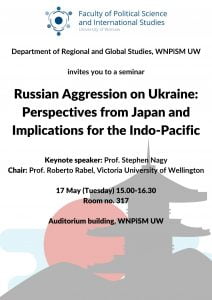Seminarium: Prof Stephen Nagy – Russian Aggression on Ukraine: Perspectives from Japan and Implications for the Indo-Pacific

Wykład: prof. Relendra Jain – The European Union and the Indo-Pacific: Challenges and Dilemmas
15 maja, 2022
Increasing Societal Resilience: Innovative Ways to Counter Disinformation and Hostile Information Activities
17 maja, 2022
W imieniu Katedry Studiów Regionalnych i Globalnych WNPISM zapraszamy na seminarium z udział prof. Stephena Nagy (International Christian University in Tokyo) pt. Russian Aggression on Ukraine: Perspectives from Japan and Implications for the Indo-Pacific.
Wydarzenie odbędzie się 17 maja o godz. 15.00 w sali 317 Gmachu Audytoryjnego WNPISM na kampusie centralnym UW. Seminarium moderował będzie prof. Roberto Rabel z Victoria University of Wellington.
Abstrakt wykładu:
The Russian agression on Ukraine is being watched closely in Tokyo and other capitals in the Indo-Pacific. It is the first time in the post WW 2 period in which one country has attempted to change its borders through force. Russia’s invasion of Ukraine has demonstrated the inability of international organizations such as the UN to stop flagrant aggression by one state on another. It has also demonstrated the importance of US leadership in building broad coalitions to push back against revisionist powers, alliances, and deterrence. The use of financial tools, sanctions and the provision of aid to enhance Ukraine’s deterrence capabilities has also been noteworthy. How does Japan understand the conflict? What are its priorities when cooperating with like-minded countries to push back against Russian aggression? What are the lessons learned by Tokyo when it comes to the implications of Russia’s invasion and the Western response for the Indo-Pacific region? This presentation examines these questions through the lens of engagement, resilience and deterrence to better understand Tokyo’s understandings and responses to revisionist powers afar and in its backyard.
O profesorze:
Dr. Stephen Nagy is a senior associate professor at the International Christian University in Tokyo, a senior research fellow at the MacDonald Laurier Institute; a fellow at the Canadian Global Affairs Institute (CGAI), a senior fellow with the East Asia Security Centre; and a visiting fellow with the Japan Institute for International Affairs (JIIA). He received his MA and Phd from Waseda University. His recent funded research projects are “Sino-Japanese Relations in the Wake of the 2012 Territorial Disputes: Investigating changes in Japanese Business’ trade and investment strategy in China”, and “Perceptions and drivers of Chinese view on Japanese and US Foreign Policy in the Region”. He is currently working on middle power approaches to great power competition in the Indo-Pacific. His latest publications include: 2021 Nagy, S.R. 2021. “Indo-Pacific Resilience, Prosperity and Stability: Canada’s Capabilities-led Approach to Strategic Free and Open Indo-Pacific Engagement,” in Canadian and Japanese FOIP Visions. Policy Perspectives, Canadian Global Affairs Institute. March 3rd, 2021. ISBN: 978-3-030-67770-1; Nagy, S. R. 2021. “Sino-Japanese Reactive Diplomacy as seen through the Interplay of the Belt and Road Initiative (BRI) and the Free and Open Indo-Pacific Vision (FOIP).” China Report: 1–15.; Nagy, S. R. 2020. “Quad-Plus? Carving out Canada’s Middle Power Role.” Journal of Indo-Pacific Affairs. Special Issue. Quad Plus: Form versus Substance, vol. 3, no. 5: 179–195.

The task “Including foreign researchers in the teaching of the University of Warsaw” is organized under the Program of Integrated Activities for the Development of the University of Warsaw and financed by the European Social Fund. The goal of the ZIP program, implemented at the University of Warsaw in 2018-2022, is to develop the competences of students, doctoral students and employees, and to introduce tools that will improve university management. The program co-financing amounts to over PLN 38 million. More information at www.zip.uw.edu.pl.






